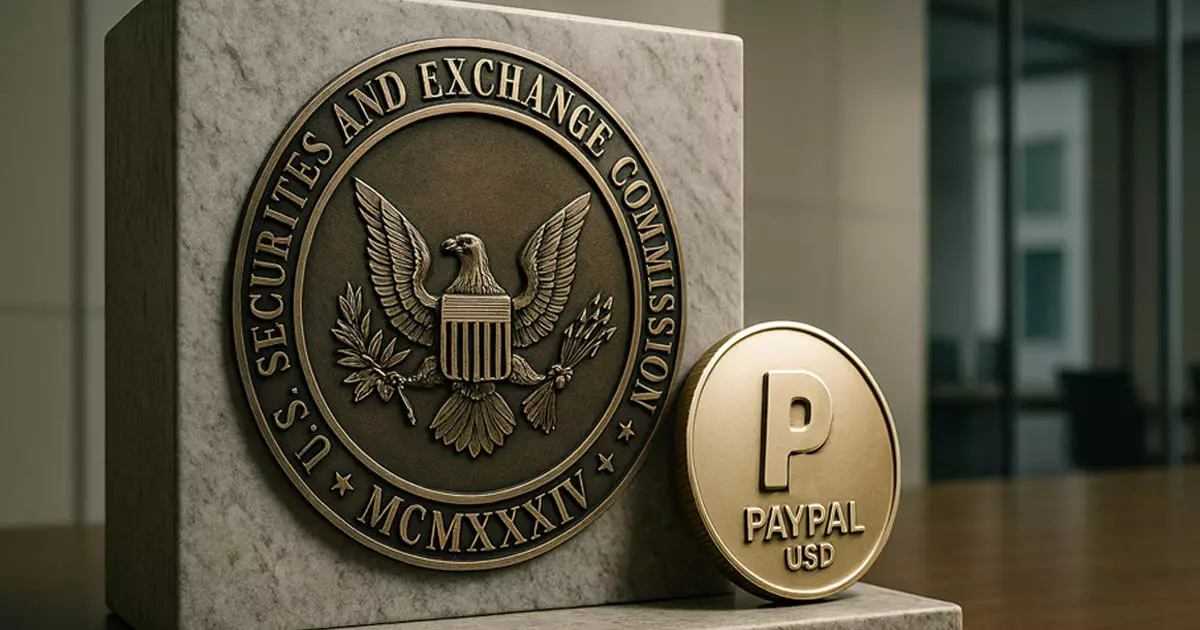The U.S. Securities and Exchange Commission’s (SEC) recent decision to halt its inquiry into PayPal’s dollar-backed stablecoin, PYUSD, marks a significant shift in the regulatory landscape. Following a heated atmosphere under the tenure of former SEC chair Gary Gensler, where the relentless pursuit of potential violations made the crypto space a minefield for innovation, this newfound restraint signals a possible thaw in the chilling grip of regulatory oversight. It invites us to ponder: Are we finally seeing a regulatory environment that favors growth and adaptation instead of stifling it?
In its latest 10-Q filing, PayPal reveals that the SEC has decided against enforcement action, effectively removing a cloud of uncertainty over the stablecoin’s operational framework. This decision not only alleviates pressure on PayPal and its partner, Paxos, but also suggests a shifting regulatory perspective that would benefit established financial giants entering the crypto space. Such regulatory leniency prompts the question, does the government view certain stablecoin frameworks as economically viable?
Paving the Way for Comprehensive Legislation
One of the ramifications of the SEC’s decision is its potential to catalyze legislative efforts, particularly the GENIUS Act, a bipartisan initiative aimed at developing clear regulatory pathways for payment stablecoins. The bill seeks to create a structured licensing framework for stablecoin issuers, positioning either the Federal Reserve or state authorities as the central regulatory bodies. By mandating 1:1 reserve backing and requiring consistent disclosures, the GENIUS Act could set a standard that reassures both issuers and consumers.
The importance of this legislative initiative cannot be overstated. With increasing skepticism toward unregulated cryptocurrency projects, a well-defined framework could invite further participation from institutional players. Ultimately, it is this scenario that could transform the crypto landscape—where products backed by sizeable players like PayPal could operate under regulatory clarity, leading to ideas that protect consumers while fostering innovation.
PayPal’s Strategic Position in the Crypto Market
PayPal’s strategic approach to integrating PYUSD within its digital ecosystem highlights the company’s intention to disrupt conventional financial systems. With the integration of this stablecoin into platforms like Venmo and the potential for offering seamless transactions to over 20 million small businesses, PayPal positions itself as an innovative leader. The company’s roadmap to establish stablecoin-based payment rails allows it to bypass traditional card networks, offering enhanced speed and cash flow management for business owners.
Despite some ambiguity around custodial liabilities associated with digital assets, PayPal’s aggressive push for adoption of PYUSD appears to disregard these uncertainties for now. Such a forward-thinking approach may pave the way for wider acceptance of digital currencies, positioning PayPal as a benchmark for those trying to navigate through the complexities of cryptocurrency while balancing risks and compliance.
The Impact of Competitive Innovations
Although PYUSD remains relatively small at approximately $879 million in circulation compared to industry giants like Tether (USDT) and USD Coin (USDC), its advanced features combined with PayPal’s clout could eventually shift the market dynamics. For instance, Coinbase’s move to waive trading fees for PYUSD and implement one-click USD redemptions exemplifies how market competition can create frictionless experiences that attract users seeking efficiency.
This development begs the question of whether PayPal will be able to leverage its integrated services to gain traction against well-established competitors. While PYUSD may not have the heft of USDT or USDC yet, the potential for exponential growth remains, especially if the legal and operational underpinnings continue to evolve favorably.
Dispelling Fear of Regulatory Overreach
The SEC’s apparent concession also serves as a beacon of hope, dispelling fears that overzealous regulatory enforcement will dominate the crypto scene. By clarifying that certain types of stablecoins—particularly USD-backed, fully reserved, and non-yield-bearing—would not be categorized as securities, the agency crafts a landscape less littered with fear-induced paralysis. This could encourage crypto startups to innovate without the fear of imminent regulation, and it also signals to investors that the government is beginning to see areas ripe for contribution rather than solely for constraint.
However, while we celebrate this development, it is crucial to observe that ambiguity remains regarding the broader classification of stablecoins. The clarity provided by the SEC’s recent statements offers a foundation, but without comprehensive rules clarifying all types of tokens, the landscape could remain confusing and fragmented—urgently highlighting the need for Congressional action instead.
PayPal’s victory isn’t simply a win for the company; it may well be a pivotal moment for the future of stablecoins, legislative frameworks, and the evolution of the entire financial ecosystem in the context of digital assets. As a center-right perspective would suggest, fostering innovation must remain at the forefront as we navigate through this uncharted territory.















